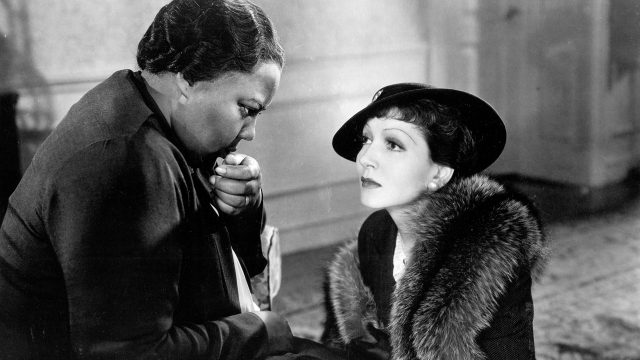Now, I do not engage in speculation about historical figures’ sexuality for the most part, because unless there’s evidence, you could always be wrong, and if they weren’t out, especially if they lived in a time when being out was acceptable, that was their business. On the other hand, when someone insists that a woman be treated as their spouse, the same way people had treated her long-time husband, that’s kind of . . . well, a thing. She denied any romantic relationship with Verna Hull despite their association looking an awful lot like a romantic relationship from the outside, but I don’t see a direct denial of the same with Helen O’Hagan—to whom, among other considerations, she left most of her estate.
Claudette Colbert was born in the eastern suburbs of Paris. The family emigrated to the US when young Lily, as she was known to the family, was about three. She grew up bilingual. Initially, she wanted to be a painter. Later, she studied fashion design. She was going by Claudette, her middle name, by high school. Colbert had been her maternal grandmother’s maiden name. She did a little acting starting in high school, but it wasn’t her first love. It’s also, I suppose, worth noting that she pronounced the name “cole-bert” for a while, because she was tired of being typecast in the French maid stereotype, which she got when she said “cole-bare.”
It’s not, I suppose, a secret that I don’t think she should’ve won the Oscar in 1934 and that Myrna Loy should have gotten it instead. (Shockingly, Loy wasn’t even nominated; there were three official nominees and Bette Davis as a write-in that year.) I will die on my “the wrong movie swept the Big Five in 1934” hill. However, that’s never been intended as shade on Colbert. She’s fine in it—arrogant, true, but a bit daffy and kindhearted. I think she’s given less to do, but what she does, she does with considerable flair. It’s definitely a classic, and her performance is definitely part of it.
From what I can tell, one of her problems with Hollywood—and goodness but she wasn’t alone—was typecasting. She didn’t want to play nothing but maids. She didn’t want to play nothing but sexpots. As she got older, she didn’t want to play nothing but mothers. Acting hadn’t been her first love, as we’ve said, and that doubtless made it easier for her to just walk away from it. She continued to appear on the stage, but film? She didn’t mind not doing that anymore. She was also one of the first big names to get into television, back in the days where it was shocking for someone with an Oscar to appear on the small screen.
I will say that, unlike with many other stars, she at least seems to have managed her money wisely. At this point, it’s something of a relief. She didn’t have to take a job on Murder, She Wrote just to keep her health insurance; she left an estate worth an estimated $3.5 million. Mostly, as I said, to her “spouse,” but also a certain amount to UCLA in honour of her late husband, a doctor, and a certain amount to her housekeeper. She also had a New York apartment and the Barbadian estate on which she died. I strongly suspect that’s at least partly tied to her early childhood poverty, though the only thing she seems to have really said about it was that climbing all those stairs to her family’s apartment gave her great legs.

